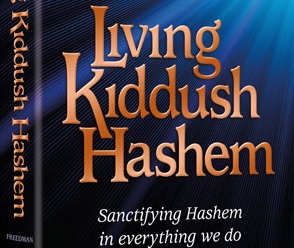 It was an exciting day at Camp Chayos Hakodesh, a summer day camp in Denver. A trip had been scheduled to the local courthouse, where the campers would have the opportunity to watch an actual criminal trial. When they arrived, a police officer
It was an exciting day at Camp Chayos Hakodesh, a summer day camp in Denver. A trip had been scheduled to the local courthouse, where the campers would have the opportunity to watch an actual criminal trial. When they arrived, a police officer
explained the workings of the court, and then they settled down to enjoy the show.
The trial was very exciting for the children. An Arab woman with a veil covering her face was brought into the court by a policeman, and it was announced that she was accused of having stolen from a store at gunpoint. The attorneys for the prosecution and the defense made their cases, and each side brought a witness to testify and be cross-examined. After fifteen minutes, it became clear that each of the two witnesses had given a different description of the accused; one claimed that she was dark-skinned, while the other maintained that she had a fair complexion. The judge ordered her to remove her veil, and she shook her head to indicate her refusal.
At the judge’s request, a police officer approached the woman and pulled the veil off her head. The campers gasped in shock, as the “defendant” turned out to be not an Arab woman at all, but one of their counselors, with his face painted blue and green. “Color war!” the counselor shouted, surprising and delighting the children.
The judge, the attorneys, and the police officers, all of whom were real, had graciously agreed to stage a mock trial for the boys as part of the color war breakout plan. “Order in the court!” the judge called, banging his gavel, as he produced a new sheaf of papers. The counselors had provided him with a short speech to read on the topic of sur mera and aseh tov; each of the color war teams was to represent one of the two concepts, and the campers were charged with learning about each of them and understanding the need for both. “It isn’t enough to stay away from evil,” the judge read aloud. “One must also contribute to goodness.”
The police officers later complimented the counselors on the campers’ excellent behavior during the mock trial, offering to repeat the performance in a future summer. But perhaps the most fascinating reaction was that of the judge himself. When the head counselor thanked the judge for his involvement, the man replied, “Actually, I should be the one to thank you for asking me to do this, because I really learned a lot from it. When I was explaining the themes and speaking about how a person must constantly evaluate his actions, making sure to avoid evil and constantly do good things, it caused me to realize that I should be examining my own life in the same way. I never thought about life in this sense, and I thank you for enlightening me.”
A week later, Rabbi Chaim Sher, the owner of the camp, received a surprising call from a non-Jewish woman. The caller explained that her son had been caught shoplifting, and the judge had sentenced him to sixteen hours of community service. The judge, who had presided over the color war breakout, suggested that his work should be done for Camp Chayos Hakodesh, a religious camp where the children are taught and practice high standards of behavior, in the hope that the campers would exert a positive influence on him. The mother asked, with a hint of desperation in her voice, if the camp had any work that her son could perform.
The concepts of sur mera and aseh tov are basic Torah concepts. Nevertheless, to a judge in the American court system, a man whose entire career revolves around justice and moral values, these elementary ideas were incredibly eye-opening.
Living with Torah values can make an incredible difference to the world around us.
In parshas Bereishis, Rashi quotes Chazal who state that the world was created “bishvil yisrael shenikra reishis”—for the sake of Klal Yisrael, who are called “the first.” We tend to understand this to mean that everything in the world was created to assist Klal Yisrael in their service of Hashem. However, the Shelah (tefilas Hashla for raising children to be talmidei chachamim) adduces a different explanation: It is because of Klal Yisrael that the world was created meaning that it is through Klal Yisrael’s service of Hashem that the entire world reaches perfection. By creating an awareness of Hashem in the rest of the world, the Jewish people cause the entire world to fulfill its purpose.
Rabbi Shraga Freedman is the author of Sefer Mekadshei Shemecha, Living Kiddush Hashem and A Life Worth Living; stories and ideas for constant Kiddush Hashem published by Artscroll Mesorah. These stories are being printed with permission from Artscroll Mesorah. Please email [email protected] or visit livingkiddushhashem.com for a free download of sefer Mekadshei Shemecha, school curricula, and other resources.
